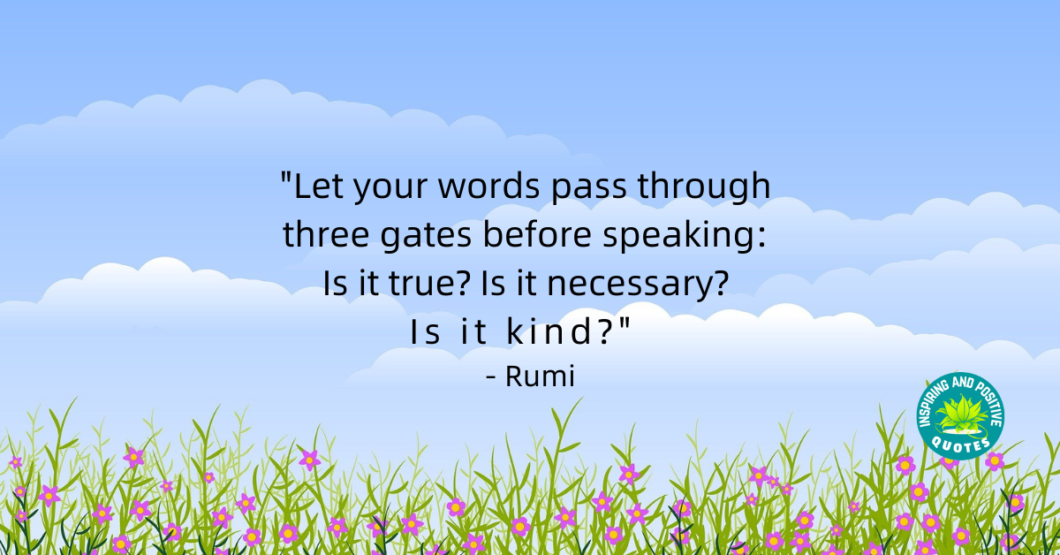In a world driven by rapid communication and the power of words, it has become more crucial than ever to recognize the impact our speech can have on others. “Think before you say something” is a timeless adage that reminds us to exercise caution and mindfulness when expressing ourselves. Every word we utter has the potential to either uplift or wound, to build bridges or create chasms. By pausing and reflecting on our thoughts before they become spoken words, we can shape a more compassionate, empathetic, and harmonious society. Let these inspiring and motivational quotes serve as gentle reminders of the profound influence our words can wield.
“Before you speak, ask yourself: Is it kind, is it necessary, is it true, does it improve the silence?” – Sai Baba
This emphasizes the need to filter our words through a thoughtful lens before speaking. We should contemplate the intentions behind our words and consider if they contribute positively to the conversation or merely add unnecessary noise.

“The words you speak become the house you live in.” – Hafiz
Hafiz’s poetic quote illustrates the idea that the language we use shapes our reality and influences how others perceive us. Our words build the foundation for our relationships and the environments we create around us.

“Think twice before you speak because your words and influence will plant the seed of either success or failure in the mind of another.” – Napoleon Hill
This highlights the profound impact our words have on others. Our speech can either empower and inspire or leave a lasting negative impression. Thus, it is essential to be conscious of the seeds we sow through our language.

“The tongue has no bones, but it is strong enough to break a heart. So be careful with your words.” – Unknown
This beautifully captures the delicate nature of communication. Despite lacking physical strength, words have the power to deeply affect emotions and can either heal or hurt, making it crucial to use them wisely.

“Remember not only to say the right thing in the right place but far more difficult still, to leave unsaid the wrong thing at the tempting moment.” – Benjamin Franklin
This reminds us that restraint in speech can be just as important as choosing the right words. Sometimes, refraining from speaking impulsively can prevent unnecessary conflicts and regrets.

“If you propose to speak, always ask yourself, is it true, is it necessary, is it kind.” – Buddha
This offers a powerful triad of considerations before speaking. By aligning our words with truth, necessity, and kindness, we ensure our communication contributes positively to the world around us.
“Let your words pass through three gates before speaking: Is it true? Is it necessary? Is it kind?” – Rumi
Rumi’s timeless advice echoes the sentiment expressed by Buddha. By thoughtfully evaluating our words through these three gates, we foster meaningful and authentic connections with others.
“Be mindful of your words. What you say can be remembered for a lifetime.” – Anonymous
We need to filter our words through a thoughtful lens before speaking. We should contemplate the intentions behind our words and consider if they contribute positively to the conversation or merely add unnecessary noise.

How to Choose Your Words Wisely
1.Self-awareness
Thinking before speaking involves being aware of our emotions, thoughts, and intentions behind what we want to say. It requires understanding our own biases, prejudices, and emotional state before communicating with others.
2.Empathy
Considering how our words might be perceived by others is a crucial element of thinking before speaking. It involves putting ourselves in the shoes of the listener and considering how our words might impact their feelings and emotions.
3.Evaluation:
Before speaking, we should assess the accuracy and truthfulness of what we are about to say. It entails verifying the information and avoiding spreading rumors, misinformation, or harmful statements.
4.Consequences
Thinking before speaking involves recognizing that our words can have lasting effects on relationships and individuals. It requires acknowledging that once words are spoken, they cannot be taken back, and the impact they have can be profound.
5.Respectful communication
Engaging in thoughtful speech means using language that is respectful, kind, and considerate. It involves refraining from using offensive or hurtful language that may demean or belittle others.
6.Mindful expression
Thinking before speaking encourages us to articulate our thoughts clearly and effectively. It means choosing the most appropriate words and tone to convey our message without causing unnecessary misunderstandings or conflicts.
7.Avoiding impulsivity
By taking a moment to reflect before responding, we can avoid reacting impulsively, especially in emotionally charged situations. This helps in preventing regrettable statements that may escalate conflicts.
Overall, thinking before you speak is a fundamental aspect of effective communication and emotional intelligence. It enables us to cultivate healthier relationships, build trust, and contribute positively to our interactions with others. By embracing this practice, we can create a more harmonious and empathetic society where words become instruments of understanding and connection rather than sources of division and pain.
6 Tips on how to Think Before You Speak
Thinking before you speak is a valuable skill that requires practice and conscious effort. Here are four practical tips to help you cultivate mindful communication and choose your words wisely.
1. Pause and Reflect
When you feel the urge to speak, pause for a moment before letting the words escape your lips. Take this brief pause as an opportunity to reflect on what you want to say and why you want to say it. Consider the potential impact of your words on the listener and whether they align with your values and intentions.
2. Listen First, Speak Second
Active listening is an essential component of thinking before speaking. Before responding in a conversation, fully engage in what the other person is saying. Pay attention to their words, emotions, and body language. Understanding their perspective allows you to respond more thoughtfully and empathetically.
3. Consider the Three Gates
Before speaking, mentally run your words through the three gates of truth, necessity, and kindness. Ask yourself if what you are about to say is true and accurate. Evaluate whether your words are necessary for the conversation or if they might add unnecessary noise. Lastly, assess whether your words are kind and respectful, promoting positive and constructive communication.
4. Manage Your Emotions
Emotions can easily lead us to speak impulsively and say things we may later regret. Learning to manage your emotions and emotional responses is vital in thinking before speaking. If you find yourself feeling angry, frustrated, or upset, take a moment to compose yourself before engaging in any conversation. Practice deep breathing or stepping away briefly to gain control over your emotions.
5. Practice Mindful Breathing
Before responding in a conversation, take a deep breath or two to center yourself. Mindful breathing helps calm your mind and emotions, allowing you to respond thoughtfully rather than reacting impulsively. Focus on your breath, and let it be a gentle reminder to pause and gather your thoughts before speaking.
6. Count to Five
When faced with a situation that triggers an emotional response, silently count to five before saying anything. This simple technique gives you a moment to process your emotions and consider the consequences of your words. It helps you avoid saying something in the heat of the moment that you may regret later.
Conclusion
Thinking before you speak is a skill that can transform your communication and relationships positively. By taking a moment to pause, listen actively, evaluate your words, and manage your emotions, you can enhance your ability to communicate mindfully and effectively. Embracing these four tips will empower you to choose your words wisely, build empathy and understanding, and contribute to a more harmonious and respectful dialogue with those around you.
As we conclude our exploration of these thought-provoking quotes, let us internalize the importance of thinking before speaking. Every conversation, every interaction, offers an opportunity to build connections and foster understanding. By exercising conscious speech, we can pave the way for more profound human connections, emotional growth, and positive change. Let us embrace the responsibility that comes with the power of language and choose to use our words to spread love, encouragement, and inspiration. Remember, in a world where words can echo long after they are spoken, the choice to think before speaking can be the difference between leaving a lasting positive impact or unintentionally causing harm.


